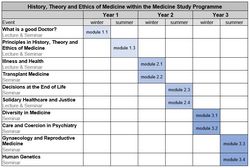Teaching
Contact
Head of Division
Prof. Dr. Mark Schweda
+49 (0)441 798-5824
Teaching Coordination
Kim Meilin Kulaczewski
kim.meilin.kulaczewski@uni-oldenburg.de
Postal Address
Carl von Ossietzky University of Oldenburg
Faculty VI Medicine and Health Services
Department of Health Services Research
Medical Ethics Division
Ammerländer Heerstr. 114-118
26129 Oldenburg
Visting Address
Campus Haarentor, Building V04
Ammerländer Heerstraße 140
26129 Oldenburg
Teaching
Teaching
An important task of the Division of Ethics in Medicine is teaching. We are involved in the design of ethics courses in various study programmes. The main focus is on the cross-sectional area of History, Theory and Ethics of Medicine in the study programme for Medicine at Faculty VI.
Doctorate
It is possible to do a doctoral project at the Division of Ethics in Medicine on topics related to ethics, theory and history of medicine. Please feel free to contact us if you are interested. You can find an overview of current doctoral projects here.
Medicine
History, Theory and Ethics of Medicine
The Division of Ethics in Medicine covers the area of History, Theory and Ethics of Medicine in the Medicine study programme. This cross-sectional area aims to sensitise students to historical, theoretical and ethical dimensions of medicine and healthcare. They are enabled to understand principles and framework conditions of medical professional practice and to recognise and analyse moral conflicts in practice in order to develop and justify practical solutions.
History, Theory and Ethics of Medicine is taught in the academic years 1 to 3 to accompany clinical studies through a purposeful combination of introductory lectures and problem-oriented group work in seminars. Topics such as one's own self-perception as a doctor, questions of justice in healthcare, human genetics, reproductive medicine, organ transplantation or end of life decisions are discussed from a historical, theoretical and ethical perspective. An approach based on specific case studies promotes ethical awareness and reference to practical fields of action.The examination format in the cross-sectional area consists of written examinations and an essay.
For the module examinations, free-text tasks are set to which students formulate their own short answers. In year 3, students write an essay on a topic from the courses in year 3. The Division of Ethics in Medicine provides guides for literature research and for writing the essay as part of the examination performance in the courses (in German). The guides can be found here:
Longitudinal Research Curriculum
The longitudinal research curriculum (LFC) is designed to introduce and guide students in scientific thinking throughout their studies, to convey basic techniques of scientific work, to give them insights into research activities, and to spark their interest in research. The Division of Ethics in Medicine offers lectures and workshops on research ethics and good scientific practice as part of the LFC. We also supervise student research projects.
Professional development
The longitudinal learning path "Professional Development" (PE) aims at the continuous development of a professional attitude as a physician through the individual acquisition and reflection of professional knowledge and values and norms. The Division of Ethics in Medicine is involved in the conception and implementation of the PE curriculum, especially for the topics "Medical Profession and Professionalism", "Medicine and Law", and "Criticism of Discrimination and Sensitivity to Diversity". In close cooperation with the Department of General Medicine, the content and didactic framework of the PE curriculum is mainly implemented in small groups accompanied by medical tutors.
Overview of History, Theory and Ethics of Medicine in the Medicine Study Programme in Oldenburg (click to enlarge):
Health Services Research
The Master's course in Health Services Research deals with questions of health research and evidence-based development of health care. The contents are adapted to the fields of both science and practice. The Division of Ethics in Medicine is responsible for the module Ethics in Health Care, in which students learn about and analyse central ethical topics and problem areas in health care, and discuss digitalisation and other current developments in health care from an ethical perspective. In addition, the Division organizes the accompanying seminar for the professional field internship, in which the students work out the theoretical-scientific background relevant for the respective institution of their professional field internship, and reflect on their own theory-practice transfer.
Advanced Nursing Practice
In the part-time Master's course in Advanced Nursing Practice (ANP) which is currently being developed, students are prepared for the professional role of clinical-practitioner nurses with science-based competences. The Division of Ethics in Medicine will be responsible for the module “Professionalism in Nursing” in a blended-learning format in the ANP degree programme. It will comprise various aspects of the professionalisation of nursing and discuss models of nursing ethical reflection as well as how to deal with challenging situations in professional nursing practice.
Molecular Biomedicine
Ethics in Medicine
The consecutive English Master’s course Molecular Biomedicine combines patient-related/clinical and fundamental research on the molecular and cellular aspects of biology with medical topics. The course “Ethics in Medicine“ is dedicated to research ethical aspects of molecular biomedicine. It offers an introduction into the history and basic principles of research ethics and discusses specific ethical issues in the context of genetic research, biobanking, or stem cell research. For the exam, students write a short essay discussing one of three questions from the course.
Engineering of Socio-Technical Systems
Philosophy of Technology
The English-language Master's course Engineering of Socio-Technical Systems (EngSTS) offers an interdisciplinary approach to the development of safety-critical computer-based interactive systems, with a special focus on the interaction between humans and technology. The Philosophy of Technology course is part of the Psychology and Philosophy of Technology module. We engage with fundamental contributions to the philosophy of technology and address questions of technology ethics as well as concrete application problems in areas such as AI, robotics, and autonomous driving. Course credit includes input to one of the sessions and a short written elaboration.

